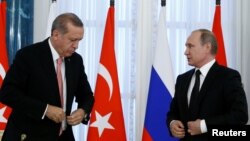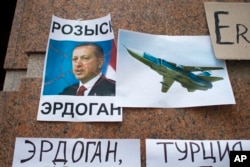Turkish President Recep Tayyip Erdogan is heading to Russia in the latest step in rapprochement efforts between the countries. Erdogan is to meet Friday with his Russian counterpart, Vladimir Putin
Erdogan will be accompanied by several of his Cabinet ministers for bilateral talks, under the auspices of the High level Cooperation Council.
The council was created as part of rapprochement efforts between the countries after the Turkish downing of a Russian jet operating from Syria in 2015.
The meeting comes as differences over Syria remain. Murat Bilhan, an analyst with the Turkish Asian Center for Strategic Studies, says the agenda will be full.
"Syria will top the agenda, plus the normalization of relations in the economic cooperation field, with the Russians also. I do not see many thorny issues between Russia and Turkey because they have already started escalation of positive relations, positive cooperation," Bilhan said.
With the Turkish economy slowing and unemployment rising, Erdogan is expected to be pushing for Moscow to end sanctions imposed against Turkey after the downing of the jet.
Former senior Turkish diplomat Aydin Selcen says despite nearly a year of rapprochement efforts, there have been few concrete gestures by Moscow.
"The relations are better, but on the other hand there is no concrete progress or development. Because we know even the famous tomato issue is not solved yet, the exporting of tomatoes to Russia. So there is little progress actually, but rhetoric-wise, everything is going for the better," Selcen said.
Progress slow in coming
Turkish media report that Moscow has agreed to ease some trade restrictions, but Syria could again threaten relations.
Earlier this year, the Syrian Kurdish group PYD opened an office in Moscow. Ankara accuses the PYD and its YPG militia of seeking to create an independent Kurdish state on its border. It also charges the PYD with being affiliated to the PKK, which is fighting the Turkish state.
Observers say Ankara has been muted in its criticism of Moscow, which last month hosted a gathering of Kurdish groups from the region, including the PYD.
Selcen says with Russia’s growing military and political influence in Syria, Ankara probably recognizes it has to work with Moscow.
"From now on, forming a policy toward Kurds of Syria, and in particular toward those PKK-affiliated elements in Syria, they will have to take in[to] consideration what Moscow and Washington, D.C., say. The Russians are also pulling the Kurds of Syria to be more realistic with Damascus. Moscow shows the limits of what can be done and what cannot be done," Selcen said.
Erdogan is expected to offer potentially lucrative arms deals, including possibly purchasing Russia’s S400 anti-aircraft missile system, which is incompatible with its NATO partners.
Weakening Turkey’s ties to its NATO partners is widely seen as a goal of Putin’s foreign policy, while analysts say Erdogan is eager to send a message that Turkey has alternatives to its traditional allies.





